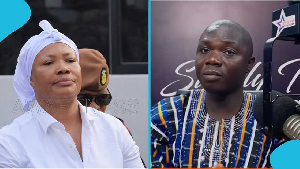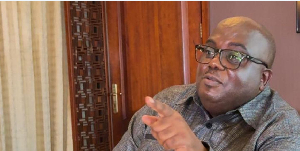Justice Mariama Owusu, an Appeal Court Judge appearing before the Appointments Committee of Parliament on Monday, during vetting to the Supreme Court, pledged to hold the tenets of the law in her rulings at the apex court and not on faith.
She accepted the offer not to answer whether she is currently a practising Muslim, but stated strongly that faith should not override the law, as her judgements would cut across conservative, liberal or socialist views.
The issue about conflict between law and religion in rulings came up, nearly generating controversy, as the prospective Supreme Court Judge, 65, nominated by President Nana Addo Dankwa Akufo-Addo last November, responded to what her position would be in case of a tango between faith and the law on the right marriage age, and property owning rights for females.
The President nominated Justice Owusu, and two other females - Justice Gertrude Torkornoo and Justice Avril Lovelace Johnson, both Appeal Court Judges for the Supreme Court, subject to approval by Parliament.
Per Article 144 Clause 1 of the 1992 Constitution, the President appoints a justice of the Supreme Court as Chief Justice, in consultation with the Council of State and with the approval of Parliament.
Article 144 (2) also enjoins the President to consult with the Council of State and submit the names and curricula vitae of nominees for appointment to the Supreme Court.
After the completion of consultations with the Council of State, in accordance with Article 144 (2), the President then has to seek the approval of Parliament for the appointment of the nominees as justices of the Supreme Court.
Tons of commendation poured in from members of the Appointments Committee, chaired by Mr Joseph Osei-Owusu, the First Deputy Speaker and MP for Bekwai, to the nominee, who was in justice administration for 38 years, with 29 of those at the bench.
She looked younger than her age, which also attracted commendation by the Committee.
Justice Owusu said it was necessary to adopt a purposeful approach to justice administration and allow lower courts to act as apex courts rather than all kinds of cases traveling to the Supreme Court
She said individuals should be able to enter into a court and not necessarily to litigate, but to learn, explaining that the Judiciary should be more opened to members of the public.
“The courtroom is a public place,” the nominee said, and further stressed the need for more education on the activities of the Judiciary.
She said the perception that the court in Ghana being conservative still exists, and called for the rules of court processes to be given a second look. “We need to do things in a more open way,” the nominee said.
On legal education, Justice Owusu praised the expansion and opening up more campuses for legal education, but stated that there was the need to maintain standards.
Justice Owusu disagreed that position that children who helped with house chores, and assisted their parents on the farm after school hours and during vacation were being exploited in child labour, as she said that was part of their upbringing, and many cocoa and other farmers do not engage in mechanised farming.
However, she called for more sensitisation on the trafficking of children under the pretext by traffickers of seeking them jobs abroad, citing that some of the porous borders and entry points were a contributory factor in the trafficking of humans.
Justice Owusu urged parents to question intensely people who front to send children to secure them jobs as she called for more encouragement for people to go to school.
She described a ruling she gave in a case involving the NDK Financial Services and the Ministry of Energy, where she ruled for the enforcement of undertaking, a judgement which she said was enforced by the Supreme Court as cases for which she would be remembered.
When the nominee was asked about her judicial temperament, she said there was no need for a judge to enter into an arena of conflict. “You don’t have to be angry with the lawyer. After all you have the last say,” she said, adding that a ruling should make one relaxed.
The last Supreme Court appointments were made in July 2018. They involved four justices, namely; Justice Samuel K. Marful-Sau, Justice Agnes M. A. Dordzie, Prof. Nii Ashie Kotey and Nene A. O. Amegatcher.
The current Chief Justice is due for retirement by this month (December 2019).
She was appointed to the Supreme Court on November 30, 1995.
General News of Tuesday, 10 December 2019
Source: ghananewsagency.org
Justice Mariama Owusu pledges to uphold law over bigotry
Opinions












